- Home
- S J MacDonald
Karadon (Fourth Fleet Irregulars)
Karadon (Fourth Fleet Irregulars) Read online
Table of Contents
Copyright
Dedication
Acknowledgements
Chapter One
Chapter Two
Chapter Three
Chapter Four
Chapter Five
Chapter Six
Chapter Seven
Chapter Eight
Chapter Nine
Chapter Ten
Chapter Eleven
Chapter Twelve
Chapter Thirteen
Chapter Fourteen
Chapter Fifteen
Chapter Sixteen
Chapter Seventeen
Chapter Eighteen
Chapter Nineteen
Chapter Twenty
Chapter Twenty One
Chapter Twenty Two
Chapter Twenty Three
Chapter Twenty Four
Chapter Twenty Five
Karadon
S J MacDonald
Copyright © 2012 S J MacDonald
All rights reserved.
This book is dedicated to Paige-Louise Green.
Paige-Louise is the winner of a raffle to make a cameo appearance in Karadon, raising funds for Henry, a great boy with “sixty five roses” Paige-Louise appears in Chapter 15.
Thank you to Paige-Louise and to all those who contributed to a great cause, fighting Cystic Fibrosis.
All royalties from paperback sales of this book during 2012 and 2013 will go to the Cystic Fibrosis Trust.
To find out more, visit www.cftrust.org.uk
Acknowledgements
Thanks to Donna Casey at www.digitaldonna.comfor the cover design.
Thanks too to Willowbrook Writers for their inspiration and enthusiasm. Keep writing, kids!
Contents
Chapter One
Chapter Two
Chapter Three
Chapter Four
Chapter Five
Chapter Six
Chapter Seven
Chapter Eight
Chapter Nine
Chapter Ten
Chapter Eleven
Chapter Twelve
Chapter Thirteen
Chapter Fourteen
Chapter Fifteen
Chapter Sixteen
Chapter Seventeen
Chapter Eighteen
Chapter Nineteen
Chapter Twenty
Chapter Twenty One
Chapter Twenty Two
Chapter Twenty Three
Chapter Twenty Four
Chapter Twenty Five
Chapter One
The airlock slammed open and four armoured figures strode through, taking up positions that covered every angle of the flight deck.
“What the...?” Tom Sutherland had been getting out of bed to respond to a proximity alert. There’d been no sense of urgency about that, just a sleepy grumbling “Who’s that at this time of night?” as the ship detected an incoming shuttle. He grabbed instinctively for a weapon before remembering that he didn’t have a gun. Or pants, either.
“Stay where you are.” A man’s voice spoke with calm authority.
Tom stayed where he was. It wasn’t as if the flight deck of a whalebelly freighter gave many options for movement even at the best of times. It was only eight steps across the biggest open space, from the flight console to the bunk. Escape routes were limited to the airlocks either side, a ladderway leading down to the cramped engine and tech space, and a hatchway leading to the hold. With the four armoured figures aboard, there was nowhere to go.
“Don’t shoot!” Tom put his hands up. He felt stunned. The armour that these people were wearing looked like standard hullwalker cyber-suits, but it had been coated in mirror chrome. Reflections flashed and moved in the suits’ many angled planes, and reflected light-shapes danced distractingly on everything around them. The only part of the suits that wasn’t dazzling was the visor. That was a menacing black.
So were the guns they were holding. Malevolent purpose gleamed from the black surfaces. They looked like the kind of rifle with which you could shoot someone from two kilometres away, or possibly blow up a building. Two of them were pointing at Tom, ominous red discs glowing on his chest.
The other two were pointing at Murg. Incredibly, she was still asleep.
Well, not so incredibly, really. According to her, Tom’s range of snoring, teeth grinding and night-time mutterings would drive a saint to homicide, so she wore ear plugs at night. He was also prone to getting up in the night and turning lights on, so she wore an eye mask too. Oblivious to the invasion of their ship and the rifles aimed at her, she slept on, snuggled in the bunk.
“We’re not armed!” Anger was chasing shock and bewilderment, and overtaking fast. “Who are you?”
He knew the answer to that, really, even as he asked the question. There was only one unit in the League that deployed boarding parties in mirrored hullwalker suits. He didn’t understand how, or why, but he knew this had to be the Fourth.
“Commander Burroughs, Fourth Fleet Irregulars.” The armoured figure who’d told him to stay still identified himself. In shocking contrast to their terrifying appearance, he spoke pleasantly, with just the trace of a Flancerian accent. “CPO Burdon, Master At Arms.” He indicated the figure beside him, then the two behind. “PO Hamil and A/S Dubata, forensics. We are executing a search warrant on your vessel, a copy of which has been signalled to your comms. I am required to inform you that this is being recorded and that any statement you make may be used as a matter of record for legal purposes. You are advised not to make any statement until you have obtained independent legal representation.”
“Search warrant?” Tom still didn’t understand how the Fourth could be here, or what was going on, but he had a very bad feeling about this.
“We have reason to believe that you have illegal drugs aboard.” The armoured officer informed him. Then he gestured towards Murg and asked, “Is she under the influence of drugs, legal or otherwise?”
“What? No! She’s just asleep. She’s got earplugs in,” Tom replied. “But what do you mean, illegal drugs? That’s outrageous! We’re ex-Fleet ourselves!”
As he was speaking, one of the figures gave Murg’s foot a little shake. She woke up, cursing a little. Then she took her mask off, saw what was going on, and yelled, scrambling back against the wall and crouching there, wide eyed with shock.
She was not, it had to be said, a glamorous figure. A podgy woman in her forties, clad in teddy-bear pyjamas and pink socks, she would have been a comical figure had it not been for the fact that her fear was real.
“It’s all right, Murg.” Tom told her quickly, though he was far from sure himself that it was all right. “It’s the Fourth. They’re from the Fourth. They think we’ve got drugs on our ship.” Seeing that she understood, though she was still crouching there, petrified, he turned back to the figure who’d identified himself as Commander Burroughs. “Will you stop pointing those guns at us!” He demanded. “I’ve told you, we’re not armed! And you have no right to come storming aboard our ship pointing guns at us like this! If you wanted to search the ship, all you had to do was ask! Drugs, for pity’s sake!” He glared up at the blank-visored figure. “There isn’t so much as an unmanifested aspro on this ship!”
“You’ll forgive us if we don’t take your word for that,” Buzz replied. “We are serving a legal search warrant. You are entitled to be present for that so long as you’re not interfering. So you can either sit down there and be quiet,” he flicked with his rifle to indicate the chairs at the flight console, “or we’ll take you aboard our shuttle while the search is in progress. Your choice.”
Tom squared up to him with as much dignity as a ma
n wearing only a pair of shorts could achieve when facing a man in gleaming cyber-armour who was pointing a very large gun at him.
“You,” he said tersely, “are going to regret this. Search as much as you want. Go on! And when you’ve confirmed that there’s nothing aboard this ship that isn’t clean and legal as per the manifest, we can start talking about charges of illegal boarding, illegal detention, threatening us with guns, and criminal damage!” He gestured to his wife. “Come over here, Murg.”
He sat down in the pilot’s chair, swung around to face the flight deck. The cyber-suited figures were even more intimidating, looking up at them from the chair. He was also acutely aware of his lack of clothing, but knew better than to even ask to be allowed to get dressed. There was no way they would allow him to go into lockers, in case there were weapons in them. “Don’t you go trashing my ship, though!” he told them. “I know my rights!”
Murg Atwood moved over and perched on the edge of the other chair. She was so tense she was shaking. She didn’t relax even when the boarding party stopped aiming guns at them. The figure identified as the master at arms stepped back to stand in guard-position by the airlock, rifle at the ready but not actually pointing at them now they were seated and compliant.
“This won’t take long,” Buzz said, staying where he was while the other two collected a tech-kit from the shuttle and went to the hatchway leading into the hold. “Our warrant is specifically to test the contents of crate 693-B-24F79, which your manifest states contains powdered almond.”
Tom heard Murg catch her breath. He was staring at Buzz himself with jaw-dropped incredulity.
“Don’t be ridiculous,” he snapped, after the moment it took him to get his head together, and then, “If you open that crate, you’d better be ready to give us a spoiled cargo docket.”
That was always a problem in searching for drugs. Cargo crates and containers intended for use in space had to be able to resist extremes of temperature and radiation. They were so heavily insulated and shielded that the only way to know for sure what was in them was to open them up and do direct physical sampling. The League, however, had very strict rules about the transport of foodstuffs from one world to another. They had to be sealed in certified sterile environments with a quarantine seal on them. If that seal was broken, even by Customs themselves, the entire contents of the crate had to be destroyed. If the cargo was found to be innocent, whichever authority had opened the crate had to be prepared to pay compensation.
“Of course. We may not even have to open it, but if we do, we’ll certainly give you a docket,” Buzz said.
The other two had now gone into the hold, and were operating the system that would bring that crate to the front. Starship cargo crates were cuboids which would fit through any standard airlock. A whalebelly freighter like the Fancy Free could carry up to two hundred and eighty such containers, or their equivalent in half and quarter crates. They were not stacked in rows like a warehouse, but in freefall, packed in on tethers. With one space always left free, any particular crate that was wanted could be shunted either to the front or to the cargo airlock. The Fancy Free’s system was old and slow, but even so it would be less than half a minute before they’d got the crate to the hold platform where they could access it.
“We’ll even give you a docket,” Buzz told them, “if it turns out to be cindar.” As they both stared at his blank-visored helmet, he tilted his head slightly to one side. “That is what you thought you were buying, right?”
“Absolutely not!” Tom’s tone was full of righteous indignation. Running “heavy” cargo was commonplace amongst spacers. It meant running highly taxed luxury items through customs mislabelled as low tax ones. The two most commonly smuggled items, by far, were cindar, an aromatic spice used in coffee, and tetracitrine, a chemical used in the food industry to create citrus flavours. Both were very highly taxed, readily disguised as other products, and very profitable. “We do not carry heavy cargo!” Tom declared.
“Well, if it is, it isn’t something we’d bother with,” Buzz replied. “We’d have to put cindar on the docket, of course, but we’d accept an amendment to your manifest, and the Fleet would honour that in paying you the value of it.”
“Seriously?” That was Murg, gasping with relief.
In fact, the Fourth was well known for that attitude to heavy cargo. It had caused a huge row when their skipper, Alex von Strada, had stated on camera that the Fourth would not go looking for uncustomed but otherwise legal cargo. They wouldn’t even take action on it if they came across it while aboard a ship for other reasons. The First Lord of the Admiralty had backed him up, saying that it was more important to build strong relationships with the merchant spacer community than to hassle them for minor offences.
Customs and Excise were known to be spitting mad over that. One of their senior people had given a media statement saying that they did not want to criticise the unit that had brought in the biggest drugs haul of the century. He had said, too, that they understood the Fleet’s position, there, and accepted the principle that sometimes you had to let the sprats go in order to catch the whale. At the same time, though, he had spoken with far more conviction about the “endemic smuggling that costs the League billions of dollars every year.”
“Honestly,” Buzz confirmed. “Unfortunately, though, we’re pretty sure it’s DPC.”
“No!” Murg protested, almost gabbling in her urgency, “We’d never touch drugs, either of us! It’s cindar, okay? It’s just cindar!”
“What?” Tom’s head snapped around, his expression horrified.
“I’m sorry, I know,” she grimaced apologetically, but her tone was defensive, “I know how you feel, but it isn’t right that it gets taxed at eighty per cent, that’s just outrageous. It doesn’t harm anyone to run it in. Everyone does it.”
“What?” Tom exclaimed again, his voice rising. “What were you thinking? It’s my name on the manifest! I’m the skipper here, legally responsible!”
“I know, I know, I know.” Murg attempted to pacify him, making a patting-the-air gesture. “Sorry. But heck, come on, even if we’re caught it’s only a fine!”
Tom swelled with indignation. “Only a fine?” He was nearly shouting, now. “Being taken to court? Having a criminal record for false manifest? I’m a former Fleet officer! My reputation would be wrecked! And you did that to me, bringing that stuff aboard, getting me to sign the manifest. I trusted you!”
“Oh, get over yourself,” said Murg, resentfully. “We’re not in the Fleet any more, in case you haven’t noticed. And it’s all right anyway, they’re not going to do anything about it, and they’ll give us a docket.”
“It is not all right!” Tom seemed to remember that they had an audience, glancing at Buzz. “We will,” he told Murg, “talk about this later.” Then, as she hunched her shoulders and glared back at him, he looked at Buzz. His manner was no longer indignant, but embarrassed. “I beg your pardon, sir. It seems you do have reason to board us, after all. I can only apologise. But… what makes you think it could be drugs?”
“We have credible information,” Buzz told him, in a tone that made it clear that that was all he would say about that. “You are aware, I suppose, that this is one of the methods traffickers use to get drugs through Customs? They know very well that the majority of spacers would spit in their eye if asked to carry DPC, but they also know most of them will take a crate of tet or cindar on the quiet.” He was clearly addressing Murg. “I know that you believed you were buying a crate of heavy cindar. But how much do you trust the people you bought it from? Or the people they bought it from? How sure are you, how sure can you be, that what’s in that crate is actually cindar?”
“I …” She started, and then stopped, looking suddenly doubtful. “They wouldn’t do that to me.”
“These people are very good at making friends with you, winning your trust.” Buzz observed. “They’re also very good at vanishing at hyperlight speed the moment you get c
aught. You have to know, too, that the defence of, “I thought I was smuggling cindar, I didn’t know it was drugs.” carries no weight at all in court. We have compelling evidence that what you have in that crate is a hundred and thirty kilos of grey DPC.”
Grey DPC meant that the drug, diacetyl-pethyl-camide, had already been cut with one of the cheaper additives used to make one or other of the many street drugs like Rainbow or Float. A hundred and thirty kilos of grey DPC would make about three times that much of street grade product.
“No!” Murg looked frightened, now. “It’s not possible!”
“Well, I hope for your sake that we’re wrong.” Buzz gestured towards the open hatchway. The suspect crate had now been brought to the platform. Instead of opening it, though, the forensics techs were attaching something to the crate’s readout panel. That was a system that displayed the crate’s internal pressure and temperature, along with the mass and distribution of the contents. It could not display any more detail than that the crate was full of boxes of a compacted powder. It was compatible with the almond powder stated on the manifest, but almost any mid-weight substance could be packed to that density.
“We’ll do a preliminary scan.” Buzz informed them. “If that reads as almond or cindar, we’ll leave it at that and be on our way with apologies. If it’s positive or inconclusive for DPC then we’ll open it up. If it then turns out to be cinder, you’ll have our apologies and compensation.”
Tom looked bewildered.
“But –what are you doing? What is that?” he asked, leaning forward a little to peer at the tech that was being attached to the crate. As Tom knew very well, there was no technology that could scan into a cargo crate with sufficient detail to be able to determine, for sure, what the substance was inside it. They were hardwiring in an oddly shaped box with a screen readout, connecting a thick wire into the crate’s diagnostics socket. The only kind of tech that used physical connection like that was very high-powered telemetry cabling.
“Hot tech,” Buzz informed him, using the Fleet term for highly classified new technology, still in the development and testing stage. “It’s a nanoscanner, which is all I can tell you.”

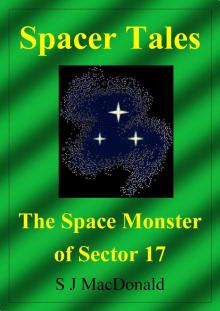 Spacer Tales: The Space Monster of Sector 17
Spacer Tales: The Space Monster of Sector 17 Spacer Tales: The Haunted Hatchway
Spacer Tales: The Haunted Hatchway Spacer Tales: The Lonely Engineer
Spacer Tales: The Lonely Engineer Spacer Tales: The Alien Monks
Spacer Tales: The Alien Monks Venturi
Venturi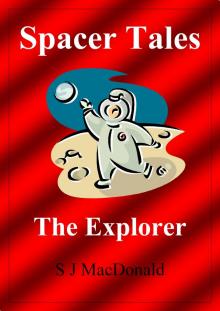 Spacer Tales: The Explorer
Spacer Tales: The Explorer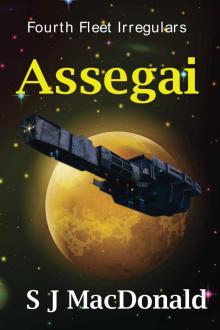 Assegai
Assegai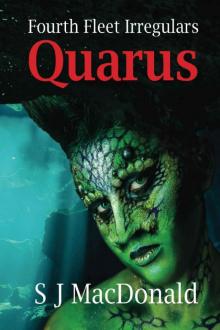 Quarus (Fourth Fleet Irregulars Book 6)
Quarus (Fourth Fleet Irregulars Book 6)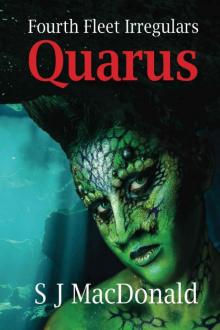 Quarus
Quarus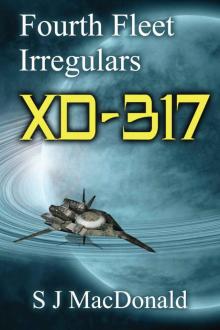 XD:317 (Fourth Fleet Irregulars)
XD:317 (Fourth Fleet Irregulars)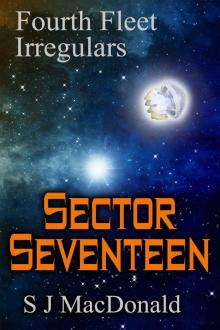 New Title 2
New Title 2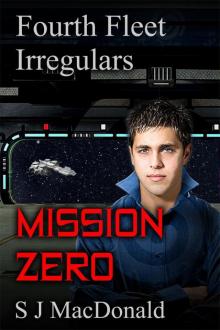 Mission Zero (Fourth Fleet Irregulars)
Mission Zero (Fourth Fleet Irregulars)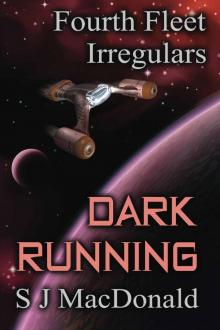 Dark Running (Fourth Fleet Irregulars Book 4)
Dark Running (Fourth Fleet Irregulars Book 4)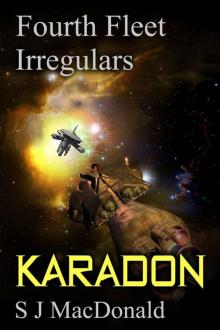 Karadon (Fourth Fleet Irregulars)
Karadon (Fourth Fleet Irregulars)